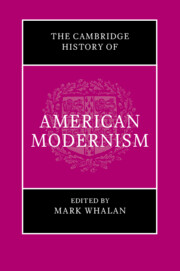Book contents
- The Cambridge History of American Modernism
- The Cambridge History of American Modernism
- Copyright page
- Contents
- Figures
- Contributors
- Acknowledgments
- Chronology
- Introduction
- Part I Methodologies
- Part II Forms, Genre, and Media
- 7 New Visual Media
- 8 Midwestern Modernism and the Radio
- 9 Modernist Writing and Painting
- 10 Modern Folk, Modernist Documentary
- 11 Skyscraper Organizations
- 12 The Jazz Age
- 13 Modernism’s Deep Roots
- 14 Modernizing the American Short Story
- 15 Modernist American Long Poems
- 16 The Modernist Lyric and Its Discontents
- 17 Anthologies
- 18 Fragile Realism
- 19 Post-World War II Theater and Media
- 20 The Limits of an American Modernist Avant-Garde
- 21 Magazines
- 22 The Modernist Presses
- 23 Literary Criticism
- 24 Libertad Bajo Palabra
- Part III Situating US Modernism
- Select Bibliography
- Index
16 - The Modernist Lyric and Its Discontents
from Part II - Forms, Genre, and Media
Published online by Cambridge University Press: 13 July 2023
- The Cambridge History of American Modernism
- The Cambridge History of American Modernism
- Copyright page
- Contents
- Figures
- Contributors
- Acknowledgments
- Chronology
- Introduction
- Part I Methodologies
- Part II Forms, Genre, and Media
- 7 New Visual Media
- 8 Midwestern Modernism and the Radio
- 9 Modernist Writing and Painting
- 10 Modern Folk, Modernist Documentary
- 11 Skyscraper Organizations
- 12 The Jazz Age
- 13 Modernism’s Deep Roots
- 14 Modernizing the American Short Story
- 15 Modernist American Long Poems
- 16 The Modernist Lyric and Its Discontents
- 17 Anthologies
- 18 Fragile Realism
- 19 Post-World War II Theater and Media
- 20 The Limits of an American Modernist Avant-Garde
- 21 Magazines
- 22 The Modernist Presses
- 23 Literary Criticism
- 24 Libertad Bajo Palabra
- Part III Situating US Modernism
- Select Bibliography
- Index
Summary
This chapter traces the modernist short poem’s hauntings by the lyric, most particularly in thinking through what came to be regarded as problems of emotion and expressive subjectivity within the discursive strains defining the modernist lyric, especially as clustered around a poetics of impersonality. The “lyric discontent” of modernism marks multiple modalities energizing modern American poetry’s varied points of emergence in the 1910s and 1920s – particularly associated with women and African American poets – among which the distrust of emotion and embrace of impersonality endured contested influence in defining the modernist lyric. Locating this discontent in the years concurrent with early articulations of modern poetry’s extinction of personal emotion and expressive subjectivity – roughly the mid-1910s to early 1920s and before New Criticism takes hold – invites consideration of poetry’s exploration of affective constructions of subjectivity that grapple with elements of emotion, expressivity, and the lyric gaze.
- Type
- Chapter
- Information
- The Cambridge History of American Modernism , pp. 285 - 302Publisher: Cambridge University PressPrint publication year: 2023

